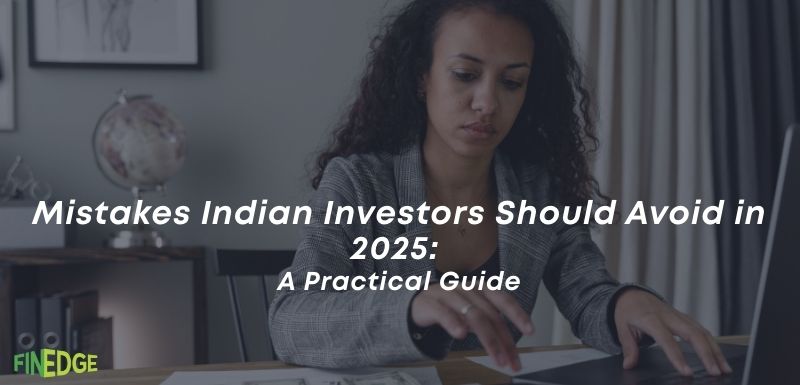Investing Insights
With over 2 decades of experience in the investment industry, Harsh is considered a subject matter expert in personal finance and has a keen interest towards the behavioral side of investing.
FinEdge’s bionic business model and its tech investment platform, Dreams into Actions (DiA), has been conceptualized by Harsh and enables the unique ability of FinEdge to bring the best of processes, people and technology together to deliver tangible value to investors.
Before founding FinEdge in 2011, he has worked extensively in the wealth management & private banking space with Standard Chartered Bank, Religare Macquarie & Dawnay Day AV.
Harsh is an MBA from Symbiosis Institute of Management Studies (Pune) and completed his BCom (Honours) from Hansraj College (New Delhi). Most of his schooling was done in Army Schools (APS – Dhaula Kuan).
Mistakes Indian Investors Should Avoid in 2025: A Practical Guide
2024 revealed more about investor behavior than it did about the markets. With over 39 lakh SIPs discontinued, rising losses from trend chasing, and a boom in social media-led advice, the year underscored a hard truth: poor behavior causes more damage than volatility ever could. As we look to 2025, it’s critical to pause, reflect, and recalibrate. This guide highlights the key mistakes Indian investors should avoid in 2025, based on the lessons of the past year — so you can invest with greater clarity, confidence, and discipline.
Goal-Based Investing: The Right Way to Plan for Financial Success
Most investors chase returns. But goal-based investing starts with your “why”, your life goals. It aligns your investment strategy with purpose, timelines, and discipline, making financial success far more achievable and less stressful.
How to Choose a Financial Planner in India: A Complete Guide
A financial planner in India helps you translate your financial goals into an actionable plan. This includes goal setting, investment strategy design, and regular portfolio monitoring. The right planner acts as a strategic partner, providing structure, clarity, and confidence through every stage of your financial journey. In this guide, we break down the key elements to consider when choosing a financial planner, the red flags to avoid, and how smart investors align advice with their long-term life goals.
Best Way for NRI Investment in India Without Falling Into Common Traps
As an NRI, you're in a rare position: you earn globally and can invest in one of the world’s most dynamic economies. But how can you make the most of your NRI investment in India without getting caught in high-cost, goal-less traps? Let’s explore what truly works, and what to avoid.
What are the Different Types of SIPs? How to Use Step-Up SIP to Reach Your Financial Goals Faster
SIPs (Systematic Investment Plans) are a cornerstone of goal-based investing in India. But did you know that there’s more than one type of SIP? From the simplicity of Regular SIPs to the adaptability of Flexible SIPs, and the acceleration potential of Step-Up SIPs, there’s a strategy for every kind of investor. In this blog, we’ll explain the different types of SIPs and show you how a Step-Up SIP could help you reach your financial goals faster.
Benefits of ELSS Investment for the Salaried Class
If you're a salaried professional looking to save tax while growing wealth, Equity Linked Savings Schemes (ELSS) might be your ideal match. ELSS funds offer tax benefits under Section 80C and come with a shorter lock-in period than most other tax-saving instruments. But their real strength lies in long-term wealth creation, especially when invested in through SIPs. Here’s how ELSS can play a strategic role in your investment plan.
Is COVID-19 Triggering These Behavioural Biases in You?
The COVID-19 market crash was more than a financial shock, it was a psychological one. For many investors, it exposed deep-seated behavioural biases that quietly shape our decisions, often at our own cost. Whether it's abandoning your SIPs during a dip or chasing trends at the wrong time, understanding these patterns is the first step toward better investment outcomes. Let’s unpack the most common behavioural traps triggered by market turbulence, and how to avoid them.
What Is the Real SIP Return After 10 Years? The Truth Long-Term Investors Should Know
In recent years, SIPs (Systematic Investment Plans) have gained immense popularity among Indian investors seeking long-term wealth creation. But how have SIPs actually performed over a decade? If you're wondering what the average SIP return in 10 years really looks like, and whether it's enough to meet your financial goals, this blog breaks down the numbers and what they mean for your future.
Common SIP Mistakes Investors Should Avoid for Long-Term Success
Systematic Investment Plans (SIPs) have become a go-to strategy for long-term investing, especially for Indian investors. But while SIPs are simple to start, avoiding common mistakes is crucial for achieving meaningful outcomes. From skipping instalments to choosing the wrong options, this blog walks you through the key SIP mistakes to avoid, and how to make the most of your investments.
How Falling Markets Can Benefit Your SIP Plan
Falling markets often make investors uneasy, but if you're investing through a Systematic Investment Plan (SIP), downturns could actually work in your favour. SIPs help you average your purchase cost, stay invested without trying to time the market, and benefit from compounding over time. This blog explores how your SIP can turn market volatility into long-term wealth-building opportunities.
Daily, Weekly, or Monthly SIP – Which One Should You Choose?
While SIPs are the preferred way for most Indian investors to invest in mutual funds, one question often comes up: should you invest daily, weekly, or monthly? Many assume more frequent investing brings higher returns, but does the data support that belief? In this article, we’ll compare SIP frequencies based on long-term market data and help you choose what’s best for your goals and convenience.
How to Generate Regular Income in Retirement Using SWPs
Retirement shouldn’t mean giving up control over your money. A Systematic Withdrawal Plan (SWP) helps you turn your investments into a regular income, on your terms.
Latest Posts
Mistakes Indian Investors Should Avoid in 2025: A Practical Guide
Jul 12, 2025
Why Past Performance Shouldn’t Guide Your Investments in 2025
Jul 10, 2025
Are Mutual Fund SIP Investments Low Risk?
Jul 08, 2025
What are the Different Types of SIPs? How to Use Step-Up SIP to Reach Your Financial Goals Faster
Jul 08, 2025
Benefits of ELSS Investment for the Salaried Class
Jul 08, 2025
The Importance of your Child’s Education Goal
Feb 28, 2024
Why Retirement Planning is Important
Nov 08, 2023
Oct 31, 2023
Investing Behaviour and the investing roller coaster
Oct 12, 2023



.jpg)
.jpg)
_(3).jpg)

.jpg)
.jpg)
.jpg)


.jpg)
.jpg)




